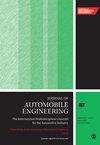Comparative analysis of different spacing policies for longitudinal control in vehicle platooning
IF 1.5
4区 工程技术
Q3 ENGINEERING, MECHANICAL
Proceedings of the Institution of Mechanical Engineers Part D-Journal of Automobile Engineering
Pub Date : 2024-08-28
DOI:10.1177/09544070241273985
引用次数: 0
Abstract
Most existing automated driving vehicles in the platoon equipped with an Adaptive Cruise Control (ACC) systems and a Cooperative Adaptive Cruise Control (CACC) systems have mainly focused on enhancing safety, improving traffic efficiency problems, and reducing workload. The spacing strategy is the core of all platoon designs, and the performance of an ACC/CACC systems hinges on the select of the spacing strategy. Although, in the literature, there are many papers dealing with platoon control, detailed explanations of the operating mechanisms of two types of spacing policies including the Headway Spacing Strategy (CTHS), and Constant Spacing Strategy (CSS), and comparative studies on them are still lacking. This work presents the studies of the longitudinal control strategy of a platoon of vehicles equipped with the existing ACC systems and CACC systems under two different spacing policies to evaluate the performances. The contributions in this work are carefully reviewed and the operating mechanisms and characteristics of two different spacing policies: the CTHS and CSS, the general evaluation criteria for spacing strategies are provided and their advantages and disadvantages are based on the numerical results. Both numerical simulations and experiments with a platoon of smart cars in real-time have demonstrated the effectiveness and practicability of the presented methodology.排车纵向控制中不同间距策略的比较分析
现有的自动驾驶车辆大多配备自适应巡航控制(ACC)系统和协同自适应巡航控制(CACC)系统,主要侧重于提高安全性、改善交通效率问题和减少工作量。间距策略是所有排队设计的核心,而 ACC/CACC 系统的性能取决于间距策略的选择。虽然有许多文献涉及排距控制,但对两类间距策略(包括超前间距策略(CTHS)和恒定间距策略(CSS))的运行机制的详细解释以及对它们的比较研究仍然缺乏。本研究介绍了在两种不同间距策略下,配备现有自动驾驶辅助系统和 CACC 系统的一排车辆的纵向控制策略,并对其性能进行了评估。我们仔细回顾了这项工作的贡献,并根据数值结果介绍了两种不同间距策略(CTHS 和 CSS)的运行机制和特点、间距策略的一般评估标准以及它们的优缺点。数值模拟和实时智能汽车排列实验都证明了所介绍方法的有效性和实用性。
本文章由计算机程序翻译,如有差异,请以英文原文为准。
求助全文
约1分钟内获得全文
求助全文
来源期刊

CiteScore
4.40
自引率
17.60%
发文量
263
审稿时长
3.5 months
期刊介绍:
The Journal of Automobile Engineering is an established, high quality multi-disciplinary journal which publishes the very best peer-reviewed science and engineering in the field.
 求助内容:
求助内容: 应助结果提醒方式:
应助结果提醒方式:


